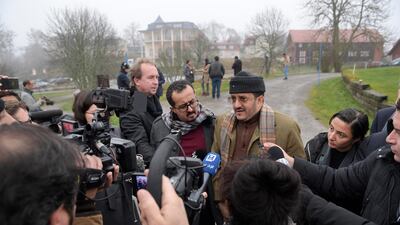Houthi rebels rejected on Friday a request made by Yemen’s government to reopen Sanaa airport to domestic flights, further complicating the second day of a UN-led peace process.
"Sanaa airport is an international airport," the rebels' representative Abdul Malik Al Ajri said.
The airport has been controlled by Houthi rebels who have battled the government for nearly four years after they overran the capital, Sanaa, in 2014.
The talks began in Sweden on Thursday, aiming to build confidence between the two sides and result in a ceasefire that could help to provide access to humanitarian aid to thousands of desperate Yemenis.
Yemen’s government delegation said on Friday morning that they were in Sweden to fully negotiate peace.
“We have submitted our proposals to the UN Envoy. We support the reopening of Sanaa’s domestic airport, for flights to depart between Sanaa and Aden,” said Yemen’s Minister of Culture, Marwan Damaj.
“This way we will lift the suffering of Yemenis and the issue of transport for citizens in Sanaa will become easier."
Mr Damj said that Yemenis must have the freedom to travel anywhere they want.
The government proposed that once the airport has opened, aeroplanes must stop in the southern city of Aden or the eastern city of Sayun for inspection, delegation member Hamza Al Kamali told The National.
“We want the airport to be under the full supervision and inspection of security forces that have been in power since 2014,” Mr Al Kamali said.
But he said that the Houthis must withdraw from Sanaa.
Peace will only prevail in Yemen once the Houthi rebels hand over their weapons and Sanaa, Mr Al Kamali said.
Hopes for the peace talks, which are taking place in a renovated castle north of Stockholm, hang in the balance.
The consultations are expected to last until December 13 with both sides under pressure to agree on a political solution.
But given that it is only the second day of the talks, there could still be a chance for concession.
Pushes for a political process have stalled, mostly recently in September, when the Houthi delegation failed to turn up in Geneva.
However, the fact that rival parties even showed up for talks is widely seen as a victory.
“Our meetings today revolved around Yemen’s humanitarian situation. The government has called for the release of prisoners and we can insure that we will succeed in implementing this issue,” Mr Damaj said.
On December 2 the government and the Houthi rebels agreed to a prisoner swap deal and for wounded fighters to be flown out for medical treatment in Oman.
The talks are expected to also cover the fate of Hodeidah, a city on Yemen's western coastline with the country's most valuable port.
If the rebels refuse to leave Hodeidah then a military offensive is still an option, the government said.
"We are now in negotiations in response to calls by the international community, the UN and the UN envoy. We are still looking into means towards peace," said Othman Al Mujali, Yemen's Agriculture Minister.
"But if they are not responsive, we have many options, including that of military decisiveness. And we are ready."
The head of the Houthi delegation, Mohammed Abdusalam, said that the port must be kept out of any military operation.
He said that a government should be “formed first before all parties are disarmed".
_______________
Read more:
Houthis launch attacks in Hodeidah as Yemen peace talks begin
Yemen’s government urges UN to take a firmer approach with Houthis
Cautious optimism reigns over Yemen peace talks
Yemen's warring parties appear together for first time since 2015
_______________
A spokesman for UN Secretary General Antonio Guterres said the talks in Stockholm would continue into the weekend, noting that the UN High Commission for Refugees released figures showing that almost 1,500 civilian casualties were reported in Yemen between August and October — an average of 123 deaths and injuries every week.
"Given the very high human cost, the UNHCR urges the parties to the conflict in Yemen to improve the protection of civilians and civilian infrastructure," spokesman Stephane Dujarric said.
"Homes and hospitals continue to be sites of violence, 23 per cent of all deaths and injuries during this period were reported in houses."
No peace talks have been held since 2016.

